Intent
A Composer is a structural pattern that may be used to employ composition when implementing an interface rather than using multiple inheritance.In particular, member function name clashes may arise when a particular context object attempts to inherit and implement many different interfaces. In fact, the more interfaces that such an object inherits, the more likely that such a name clash will arise.
Such a clash can be a real show-stopper for large concrete implementation objects, and renaming the operations in one of the conflicting interfaces is not only impractical, but often impossible when using third party libraries.
The Composer pattern makes use of C++ member function pointers to solve this problem in a general way that does not require changing an interface.
Also Known As
There are no other known names for this pattern.Motivation
Imagine an class namedContext, which would use
multiple-inheritance to implement the pure-virtual methods
from two different classes Api1 and Api2
as shown in Figure 1.
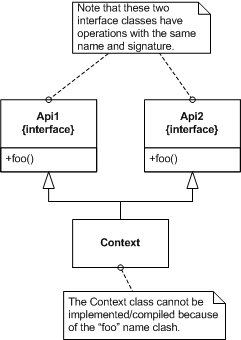
Figure 2
However, both of the interfaces Api1 and Api2
have an operation named foo() with the same signature.
This creates ambiguity and the class Context cannot be
implemented.
This problem can be solved by using composition, and this can be done generically by applying member function pointers and the C++ template facility.
First, we create the Composers as shown in Figures 2 and 3.
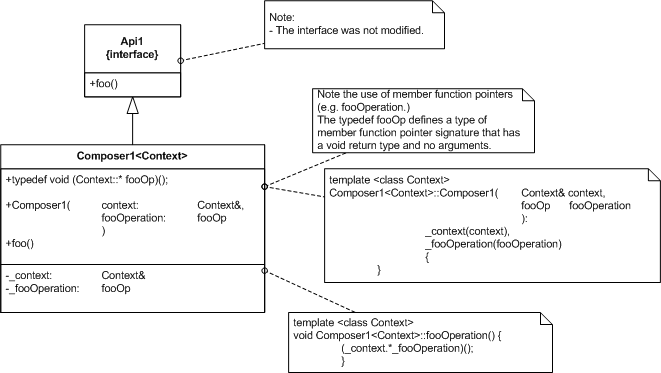
Figure 2
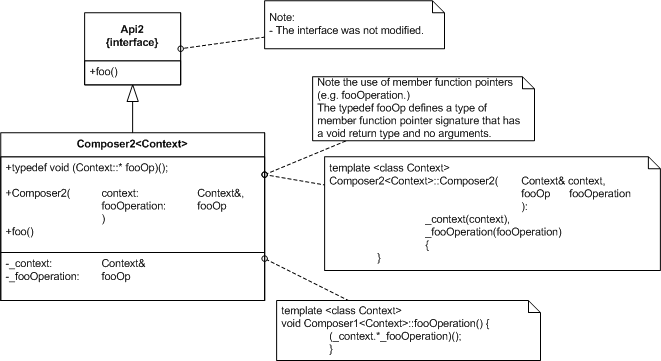
Figure 3
It is interesting to note that the individual Composers
(Composer1 and Composer2) are associated with the
interface that they implement, and are general enough to be
used in other contexts. This is an improvement over a more
context specific composition solution.
Finally, we show how the individual Composers are used by the a context in Figure 4.
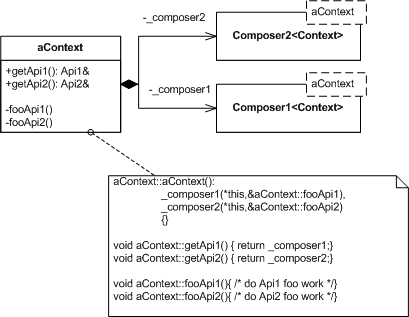
Figure 4
The first important feature to notice is that the Context
(aContext) implements two member functions with
signatures that match the Api1 and Api2
interface foo() operations.
The next important feature are the public operations that export
references to the Api1 and Api2 interfaces
to the application context.
The note containing the implementation code in Figure 4, illustrates some details of how a Context makes use of a Composer.
The initializers in the constructor aContext::aContext()
illustrate how the (rather bizzare) C++ syntax for member function
pointers is used to satisfy the constructors for _composer1
and _composer2. Also note that the first argument to
each is a reference to the Context aContext
using the *this syntax.
Finally, the operations void aContext::fooApi1() and
void aContext::fooApi2() do the actual implementation
work within the aContext class.
Applicability
What are the situations in which the design pattern can be applied? What are examples of poor designs that the pattern can address? How can you recognize these situations?Structure
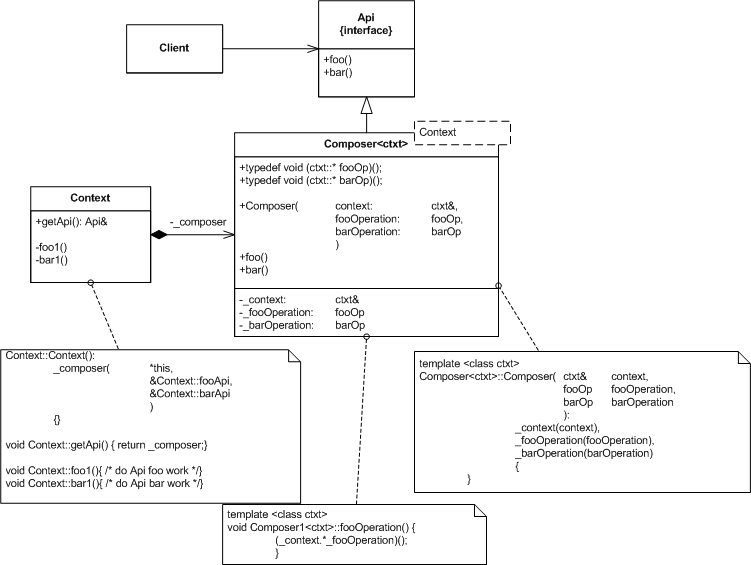
Figure 4
Participants
Client-
While technically not a part of the Composer pattern,
the Client represents an entity that invokes
the operations of the
Apiclass. Composer-
The
Composeris an implementation of theApi, which converts eachApimethod/operation into a corresponding member function pointer call. For general reuse, theContextshould be associated with theApithat it implements. This allows theComposerto be reused in many Contexts.The
Composeris implemented as a C++ template, which may be used in any Context specified by itsctxttemplate parameter. Api-
The
Apiis the interface that is implemented by theComposerto allow Contexts to use composition rather than mulitple inheritance. Context-
The
Contextis the software that implements the actual functionality of theApithrough the member function callbacks that it implements and passes through theComposerconstructor.
Collaborations
TheContext implements the abstraction described by the
Api interface. This abstract interface is defined so as
to enable the Client to take advantage of different implementations
of the Api through polymorphism. The Composer
enables the Context to use composition rather than
inheritance. The composition technique avoids issues
with method name clashes. This is especially important when the
Context implements many different Api interfaces
of either the same or different type.
When the Client invokes the foo() operation
of the Api, the foo() operation of the
Composer is executed via polymorphism. The implementation
of the foo() operation within the Composer
invokes the associated member function pointer, which, in this case
invokes the foo1() operation of the Context.
It is this foo1() operation that actually implements the
concrete operation.
Consequences
The Composer achieves its goals through the use of the C++ template mechanism and the use of member function pointers. This has several consequences.- Reusability of the code is enhanced through moving the burden for name clash resolution to the context and away from the abstraction.
- Performance is impacted due to double indirection. This could be an issue for speed critical paths.
- Memory usage is increased since there is writable RAM storage
required for each member function pointer in each instance, corresponding
to each operation in the
Api.
The Composer pattern allows the user to vary implementations
of the Api without resorting to modification of an
Api. A Composer can be written once for a
corresponding Api and reused in any Context.
Implementation
A Composer for anApi with many operations and
many different function signatures is quite tedious to code.
However, since the Composer is a write-once reuse many
construct, it is usually well worth the effort.
The Composer lends itself to code generation, and it
is conceivable that a Composer template could be
generated directly from its corresponding Api
header file.
Sample Code
api.h
#ifndef _apih_
#define _apih_
class Api {
public:
virtual void foo()=0;
};
#endif
composer.h
#include "api.h"
template
class Composer : public Api {
public:
typedef void (ctxt::* fooOp)();
private:
ctxt& _ctxt;
fooOp _fooOperation;
public:
Composer( ctxt& context,
fooOp fooOperation
);
private: // Api
void foo();
};
template
Composer::Composer( ctxt& context,
fooOp fooOperation
):
_context(context),
_fooOperation(fooOperation)
{
}
template
void Composer::foo() {
(_context.*_fooOperation)();
}
context.h
#ifndef _contexth_
#define _contexth_
#include "context.h"
class Context {
private:
Composer _composer;
public:
Context();
private:
void foo1();
};
#endif
context.cpp
#include "context.h"
#include
Context::Context():
_composer(*this,&Context::foo1)
{
}
void Context::foo1() {
printf("foo implementation!\n");
}